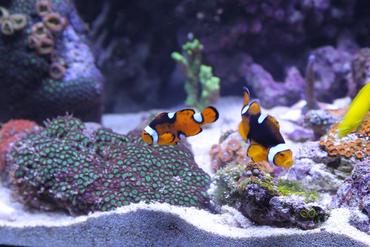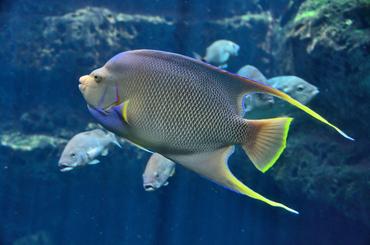NUTRITIONAL NEEDS OF SALTWATER AQUARIUM FISH

Updated
In order to keep your saltwater aquarium fish healthy you need to understand and meet their basic nutritional needs.
When it comes to keeping your saltwater aquarium fish happy and healthy, nothing is quite as important as balanced nutrition. If your fish are well-fed, they will be less stressed and will have an increased capacity to recover from illness and injury. Fish that do not receive a balanced diet are unlikely to be healthy and, in the event that they become stressed, injured or sick they will have a harder time making a full recovery. In order to make sure that your saltwater aquarium fish remain healthy it is important to understand their nutritional needs so you can provide them with a balanced diet. The first step in creating a balanced diet for your fish is to understand the nutrients they need.
Types of Nutrients
Protein = Protein is one of the most important nutrients for aquarium fish – it is essential in order to maintain healthy growth. The amount of protein any particular species of fish may vary depending whether it is a carnivore or herbivore, but all fish require some protein in their diets. Protein is made up of various amino acids, 10 of which are required as part of a healthy diet for marine fish.
Carbohydrate = For aquarium fish, carbohydrates are a key source of energy – carbohydrates are complex chemicals that can be broken down into simple sugars and metabolized as energy. Because the bodies of marine fish cannot produce carbohydrate or simple sugar, it is necessary to obtain them from the daily diet.
Fats = Also called lipids, fats are another essential element of a balanced diet for marine fish. Fats are used to insulate the body of marine fish in order to maintain body temperature and to promote healthy cell function. Some of the most important fats for marine fish to receive from their diet are fatty acids like Omega-3 fatty acids.
Vitamins = In addition to protein, carbohydrate and fats, vitamins are essential for marine fishes in order to maintain the healthy growth of bone and tissue. Some of the most important vitamins for marine fish to receive as part of their daily diet include Vitamin C as well as Vitamins B1, B2 and B6.
Trace Elements = There are approximately 115 known elements and 75 of them are considered “natural” – all 75 of these elements can naturally be found in the ocean. Of these 75 elements, marine fish require at least 13 of them in order to thrive – this group of trace elements is often referred to as the group of “micro facilitators”.
Sources for Nutrients
In order to provide your marine fish with a healthy, balanced diet you need to know not only what types of nutrients your fish need, but also what kinds of food contain those nutrients. Protein is generally derived from meat-based foods, though it can also be obtained from various types of vegetable matter including seaweed, spirulina and other algae. Live, frozen and freeze-dried foods like brine shrimp, prawns, tubifex worms, feeder fish and bloodworms are all excellent sources of protein. White worms and other live foods can also be a good source of fats, or lipids. All fish, whether herbivorous or carnivorous, will benefit from some vegetable matter in their diet as a means of receiving healthy carbohydrates. Commercial vegetable-based flakes, algae wafer and fresh vegetables are all good sources of carbohydrate.
Breakdown of Feeding Requirements
Carnivores = A carnivore is an animal which derives a majority of its nutrients from meat-based foods. Carnivorous species of fish typically feed on insects, insect larvae, crustaceans and other fish. These fish require a diet that is made up of between 45% and 70% protein from various sources. The ideal diet for carnivorous marine fish will be made up of around 75% whole marine foods such as krill, clams, Mysis shrimp and marine feeder fish. Though carnivores may accept fresh vegetables, the majority of their diet should be made up of protein-based foods.
Herbivores = Herbivores are animals which receive the majority of their nutrients from vegetable-based foods. To formulate a healthy diet for herbivorous marine fishes, offer your fish about 35% or 40% fresh vegetables and the remainder of the diet should be composed of whole marine foods like plankton, algae and krill.
Omnivores = Omnivorous species of fish consume both plant- and meat-based foods and they require a diet that contains no more than 35% whole marine foods. The remainder of the diet for these fish should be made up of fresh vegetables. As omnivorous species of fish mature, they require more vegetable matter and less protein.
Cultivating a thriving marine tank requires more than just proper tank setup. In order to keep your saltwater aquarium fish healthy, you need to provide them with a well-balanced diet. Saltwater aquarium fish cannot be fed foods formulated for freshwater fish and they will not thrive unless you provide them with whole marine foods. If you want to keep your fish as healthy as possible, learn the basics about saltwater fish nutrition so you can properly meet the needs of your fish.































































































